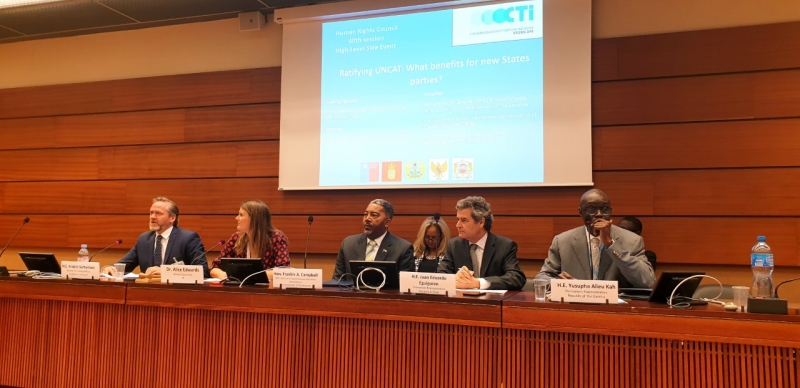Aiming for universality: States highlight the benefits of having ratified UNCAT
On the first day of the 40th session of the UN Human Rights Council, the Convention against Torture Initiative (CTI) hosted a side event on the benefits of ratifying the UN Convention against Torture and Other Cruel, Inhuman or Degrading Treatment or Punishment (UNCAT) at the Palais des Nations. The event was attended by over 60 persons, including representatives of 28 countries, and focused particularly on the experiences of new UNCAT State parties.

In his opening remarks, the Minister for Foreign Affairs of Denmark, His Excellency Anders Samuelsen, recalled CTI’s aspiration of universal ratification of the Convention by the year 2024. He underlined that ratifying the Convention sends the message that “torture is completely unacceptable and cannot be tolerated under any circumstances”. “This political statement” he said “is worth making in itself”, while adding however that “the most substantial gains of ratification are those that happen within our own countries”, including by continuously examining domestic laws, as well as by engaging in dialogue with the UN Committee against Torture.
The distinguished panelists were the Honourable Frankie A. Campbell, Member of Parliament and Minister of Social Services and Urban Development of the Commonwealth of The Bahamas; His Excellency Yusupha Alieu Kah, Permanent Representative of The Gambia to the United Nations in Geneva, and His Excellency Juan Eduardo Eguiguren, Permanent Representative of Chile to the United Nations in Geneva. They shared national experiences, including the reasons why the governments of their countries had decided to ratify UNCAT, as well as the laws, policies and other practical developments prompted by UNCAT. The discussion was moderated by Dr. Alice Edwards, Head of the CTI Secretariat.
The Hon. Minister of the Bahamas underlined the fact that even though protection from torture is a constitutional right in The Bahamas, ratifying the Convention encouraged a mapping of the Bahamian legal system in order to ensure greater compliance with international obligations and steps to improve the fair administration of justice. By ratifying the Convention and consenting to international scrutiny, he said, the ultimate goal is to strengthen the rule of law for the benefit of our citizens and “to promote the basic virtues of tolerance and inclusiveness”.
Ambassador Kah explained how The Gambia had decided to ratify the Convention after the country’s 22 year dictatorship to usher in “a new dawn of democracy and human rights”, and to make sure that the country would “never again return to the dark days of torture, killings and enforced disappearances”. He also insisted on the need for a collective and multilateral approach to the fight against torture and in ensuring respect for the rule of law.
Ambassador Eguiguren of Chile, a country that has been a party to UNCAT for 30 years, shared how ratification of UNCAT by Chile allowed for Chilean society and political structures to become aware of the value of human dignity, after the serious violations of human rights that took place in Chile between 1973 and 1990. While recognising the absolute nature of the prohibition of torture, he explained that ratification has permitted a modernisation of the judicial system as a whole, in particular the criminal justice system and interrogation methods. By implementing the Convention, Chile is to this day investigating and punishing past abuses, while providing remedies to the victims.
After the panelists’ remarks, an open discussion followed, during which some of the below ideas were mentioned:
- Perfect compliance with the provisions of UNCAT is not a pre-requisite to ratification, and mapping and adapting the domestic legal system could take place after ratification and periodically.
- The global campaign for ratification helps to make visible issues related to torture and ill-treatment, and creates a new momentum every time a new ratification is achieved.
- The post-ratification period allows for improvement and reforms at the national level by raising awareness, including among civil society and society in general.
- The importance of adopting humane interviewing techniques, whether for interviews of suspects, witnesses or victims in police investigations, or in the sensitive context of truth, reconciliation and reparations commissions.
The discussion was concluded by a message to all non-States-parties to UNCAT, paraphrasing the words from the Secretary General of the United Nations, H.E. Antonio Guterres’ speech earlier in the morning, who said that “human rights are not about perfection, they are about progress”. Ratifying and implementing UNCAT, the panel underlined, is a commitment to making progress, and a State doesn’t need to be perfect to take that step.
For more information on the benefits of ratification for Chile, see CTI’s blog on Chile.
For more information on the benefits of ratification for Fiji, see CTI’s blog on Fiji.
For more information on the ratification of UNCAT, see the CTI Ratification Tool.
For more information on humane investigating techniques, see CTI’s tool on non-coercive investigative interviewing.

